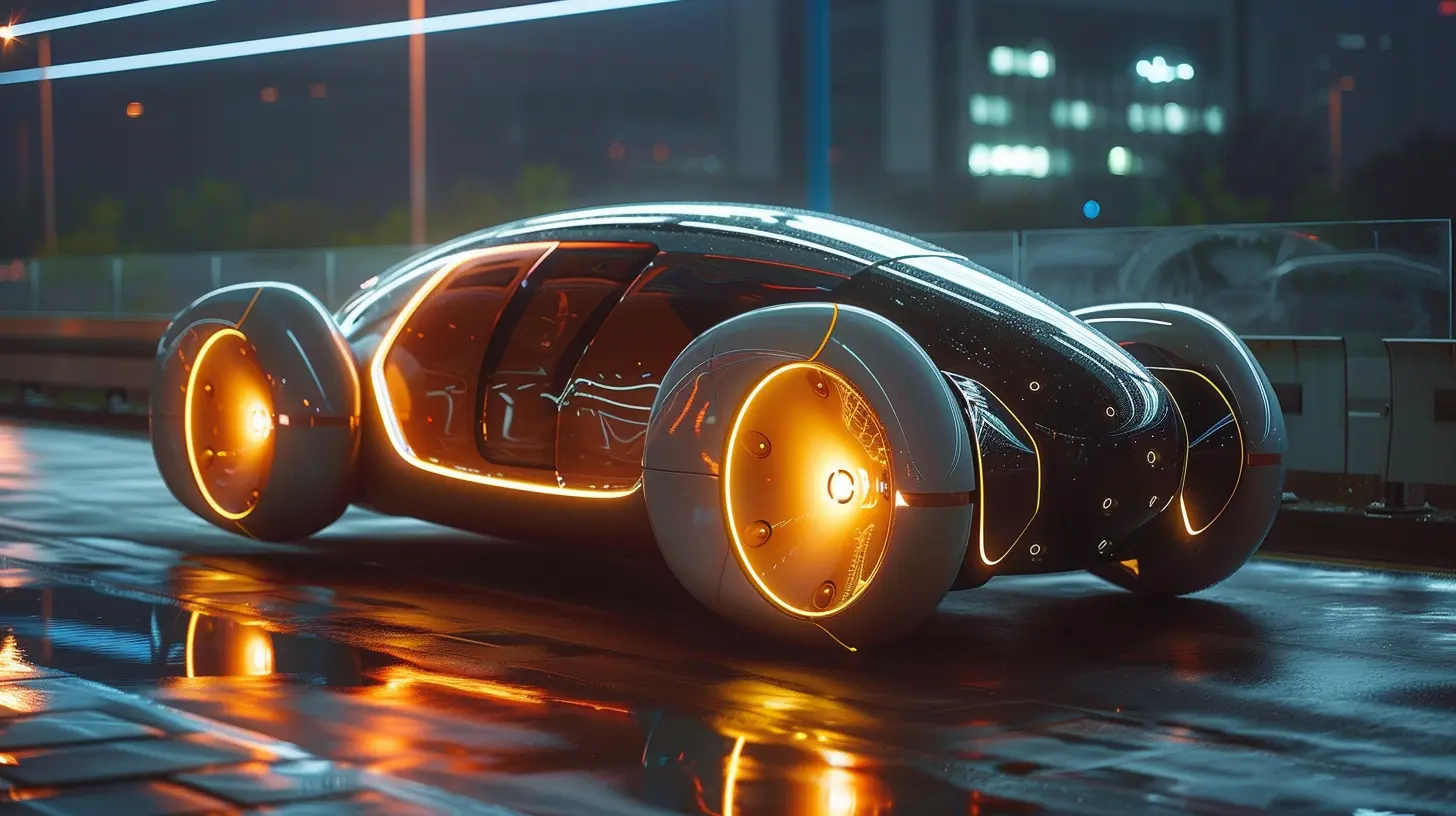The Role of Digital Assistants in the Future of Autonomous Vehicles
24 August 2025
Technology is evolving at a rapid pace, and one of the most exciting innovations is the development of autonomous vehicles. Self-driving cars are no longer just a sci-fi fantasy—they're becoming a reality. But as these vehicles take over the roads, one question remains: How will we interact with them? Enter digital assistants. These AI-powered companions are set to play a massive role in shaping our experience with autonomous vehicles.
So, what’s the big deal about digital assistants in self-driving cars, and how will they change the way we travel? Let’s dive in.

The Rise of Digital Assistants in Everyday Life
Before we get into their role in autonomous vehicles, let's talk about where we are now. Digital assistants like Siri, Alexa, and Google Assistant have already become a part of our routines. Whether it’s setting reminders, controlling smart home devices, or even ordering groceries, these AI-powered tools simplify our lives.It's only logical that the next step for digital assistants is to integrate into our vehicles. In fact, many modern cars already come with voice-controlled features. But with autonomous vehicles, the role of digital assistants is about to go to a whole new level.

Why Do Autonomous Vehicles Need Digital Assistants?
Autonomous vehicles are designed to drive themselves, eliminating the need for human drivers. However, that doesn’t mean passengers won't need interaction with their vehicles. This is where digital assistants step in.Instead of focusing on the road, passengers can rely on AI assistants to handle everything from navigation, entertainment, and trip scheduling to personal productivity. Think of them as your personal travel companion who takes care of everything while you sit back and enjoy the ride.

How Digital Assistants Will Enhance Autonomous Vehicle Experiences
1. Voice-Controlled Navigation and Communication
With no driver behind the wheel, passengers will need a way to communicate with their vehicle. Digital assistants will allow users to interact with their cars using natural language. You’ll be able to say things like:- “Take me to the nearest coffee shop.”
- “Find a gas station along the route.”
- “Call Mom and let her know I’m on my way.”
The car will process these commands and take appropriate action, making the driving experience seamless and hands-free.
2. Personalized Travel Experience
Digital assistants will learn user preferences over time. Just like Netflix suggests shows based on your watching history, your car’s AI assistant will curate your travel experience.Imagine stepping into your car and it automatically adjusts the temperature, plays your favorite playlist, and even recommends the best route based on traffic and weather conditions. The days of manually configuring settings every time you drive will soon be a thing of the past.
3. Seamless Integration with Smart Homes
Autonomous vehicles won’t just be standalone tech—they’ll be part of a larger digital ecosystem. Digital assistants will enable seamless connectivity between your car and smart home devices.For example, as you head home from work, you can instruct your car’s assistant to:
- Turn on the air conditioning.
- Preheat the oven.
- Activate the home security system.
By the time you arrive, your home will be perfectly set up, making your life more convenient.
4. Enhanced Safety Features
While autonomous vehicles are designed to be incredibly safe, there’s always room for improvement. Digital assistants will enhance safety by monitoring passenger behavior and vehicle conditions.Some examples include:
- Detecting signs of drowsiness or distress in passengers.
- Alerting emergency services in case of an accident.
- Providing real-time weather and road condition updates.
With AI continuously monitoring and analyzing situations, safety standards will reach a whole new level.
5. Entertainment on the Go
Since passengers won’t have to focus on driving, entertainment will become a key aspect of autonomous vehicle travel. Digital assistants will provide a fully immersive media experience, allowing users to:- Stream movies and music.
- Play interactive games.
- Conduct virtual meetings on the go.
Essentially, your car will become a mobile entertainment hub, transforming long commutes into enjoyable experiences.
6. AI-Powered Customer Support
Car manufacturers and ride-sharing services will likely integrate AI-driven customer support into their autonomous vehicles. This means that if anything goes wrong, a digital assistant will be there to troubleshoot issues in real-time.Instead of waiting on hold with a support center, you’ll be able to ask your car questions like:
- "Why aren’t the windows rolling down?"
- "How do I activate the massage seats?"
- "What does this warning light mean?"
And just like that, your AI assistant will offer solutions or connect you with a human representative if needed.

Challenges and Concerns with Digital Assistants in Self-Driving Cars
Of course, integrating digital assistants into autonomous vehicles isn’t without challenges. Some concerns that need to be addressed include:1. Privacy and Security Risks
With AI assistants gathering vast amounts of data, privacy concerns are inevitable. Companies will need to ensure that user data is protected and not misused.2. Dependency on Internet Connectivity
For digital assistants to function effectively, they’ll need constant internet access. In remote areas with poor signal strength, this could be an issue.3. AI Misinterpretation
Ever had Siri or Alexa misinterpret a command? The same risk applies to digital assistants in self-driving cars. A misunderstood instruction could result in navigation errors or incorrect actions.4. Ethical Considerations
Who takes responsibility if an AI assistant makes a decision that leads to an accident? Ethical considerations surrounding AI in autonomous vehicles are still being debated.The Future of Digital Assistants in Autonomous Vehicles
Despite these challenges, the future looks bright. As AI technology improves, digital assistants will become smarter, more responsive, and highly intuitive. In the next decade, we can expect:- Hyper-personalized AI: Your car will understand your habits, anticipate your needs, and even adapt its responses based on your mood.
- Multimodal interaction: Instead of just voice commands, users will interact using gestures, touch, and even facial expressions.
- Advanced predictive capabilities: AI will be able to predict traffic delays, road hazards, and even suggest alternative travel plans before you ask.
The idea of a self-driving car isn’t just about getting from point A to point B. It’s about creating an intelligent travel ecosystem that makes commuting stress-free, efficient, and even enjoyable.
Final Thoughts
Digital assistants are set to transform the way we interact with autonomous vehicles. From voice-controlled navigation and personalized experiences to enhanced safety and entertainment, AI-powered assistants will redefine the future of transportation. While there are challenges to overcome, the benefits far outweigh the risks.The road ahead is exciting, and pretty soon, we might be commuting in vehicles that feel more like smart companions than just cars. So, are you ready to sit back, relax, and let AI take the wheel?
all images in this post were generated using AI tools
Category:
Digital AssistantsAuthor:

Adeline Taylor
Discussion
rate this article
1 comments
Kian Banks
Imagine a future where your car not only drives itself but also argues with you over the best podcast to play. Digital assistants in autonomous vehicles could soon become our chattiest co-pilots, ensuring we never miss a chance to debate who really is the best superhero!
September 11, 2025 at 3:40 AM

Adeline Taylor
Absolutely! The rise of digital assistants in autonomous vehicles could transform our travel experience into lively discussions, making every journey not just about getting to a destination, but also about engaging conversations and debates along the way.


